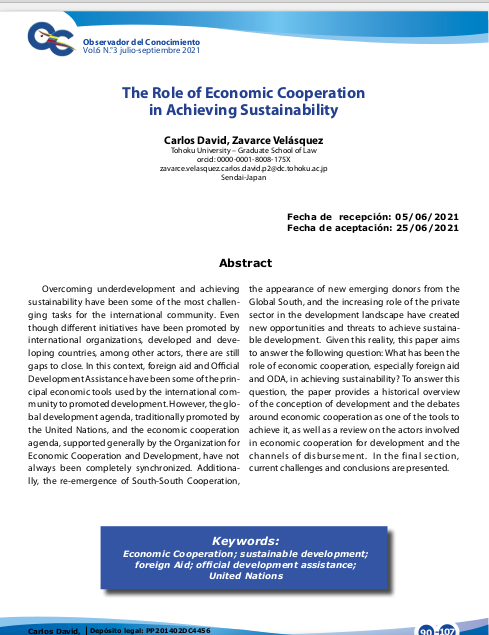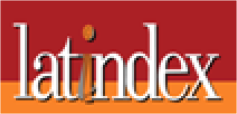El rol de la cooperación económica para alcanzar la sostenibilidad
Palabras clave:
Cooperación económica, desarrollo sostenible, ayuda extranjera, asistencia oficial para el desarrollo, Naciones UnidasResumen
Superar el subdesarrollo y alcanzar el desarrollo sostenible han sido algunos de los retos más importantes para la comunidad internacional. Históricamente se han impulsado diversas iniciativas desde organismos internacionales, países desarrollados y en vías de desarrollo, no obstante aún existen brechas por cerrar. En este contexto la cooperación económica, en especial la Ayuda Extranjera y la Asistencia Oficial para el Desarrollo (AOD) han sido promovidas como herramientas claves para promover y alcanzar el desarrollo sostenible. Sin embargo, la agenda de desarrollo global, tradicionalmente promovida por las Naciones Unidas y la agenda de cooperación económica, impulsada generalmente por la Organización para la Cooperación y el Desarrollo Económico, no siempre han estado completamente sincronizadas. Adicionalmente, el resurgimiento de la cooperación Sur-Sur, la aparición de nuevos donantes emergentes del Sur Global y el creciente rol del sector privado en el escenario de la cooperación económica mundial han traído consigo tanto nuevas oportunidades como amenazas para alcanzar el desarrollo sostenible. Dada esta realidad, este artículo intenta responder la siguiente interrogante: ¿Cuál ha sido el rol de la cooperación económica, en especial la Ayuda Extranjera y la AOD, en el logro de la sostenibilidad? Para responder esta pregunta, el artículo provee una revisión histórica de la concepción del desarrollo y de los debates sobre la cooperación económica como una de las principales herramientas para alcanzarlo. Así mismo, suministra un mapeo de los actores involucrados en la cooperación económica para el desarrollo y sus canales de desembolso. En la sección final se presentan los retos actuales y las conclusiones.
Descargas
Citas
Asplund, A. & Soderberg, M. (2017). Japanese Development Cooperation: The Making of an Aid Architecture Pivoting to Asia. Routledge.
Bergamaschi, I. & Tickner, A. (2017). South-South Cooperation Beyond the Myths: Rising Donors, New Aid Practices?. Palgrave Macmillan.
Brundtland Commission. (1987). Our Common Future. The United Nations and Cambridge University Press.
Coate, R. ‘Sustainable Development Governance’ in Thomas Weiss and Rorden Wilkinson (eds.) From International Organization and Global Governance, 2nd ed. London Routledge, 2018.
Deaton, A. (2013). The Great Escape: Health, Wealth, and the Origins of Inequality. Princeton University Press.
Dollar, D. & Pritchett, L. (1998). Assessing Aid: What Works, What Doesn’t and Why. World Bank Policy Research Report. Oxford University Press. New York
Easterly, W. (2006). The white man's burden: why the West's efforts to aid the rest have done so much ill and so little good. New York: Penguin Press.
Esteban, M. & Pérez, A. (2017). Chinese financing of Latin American development: Competition or complementarity with traditional donors?, in Eckart Woertz (ed.), Reconfiguration of the Global South: Africa, Latin America and the Asian Century, Nueva York: Routledge: 217-236. ISBN: 978-1-85743-863-5-
García, J. (2020). Hacia una nueva cooperacion post-pandemia. CAF Banco de Desarrollo de America Latina.
Gomez, O. (2019). Humanitarian Crises and the Rise of the Rest: The Future of Humanitarianism from the Perspective of Four Latin American Emerging Countries. JICA Research Institute.
Hirst, M. (2010). America Latina y la Cooperación Sur-Sur: Reflexiones Conceptuales y Politicas. In Ayllon, B & Surasky, J. (2010). La Cooperacion Sur-Sur en America Latina: Utopia y Realidad. Universidad Complutense de Madrid.
Hynes, W. & S. Scott. (2013). The Evolution of Official Development Assistance: Achievements, Criticisms and a Way Forward. OECD Development Co-operation Working Papers, No. 12, OECD Publishing.
Hulme, D. (2009). The Millennium Development Goals (MDGs): A Short History of the World’s Biggest Promise. BWPI Working Paper 100. The University of Manchester.
International Peace Institute. (2009). Underdevelopment, Resource Scarcity, and Environmental Degradation. IPI Blue Papers. New York.
Japan International Cooperation Agency. (2021). Japan's ODA and JICA. URL: https://www.jica.go.jp/english/about/oda/index.html (Visited: July 20, 2021).
Kragelund, P. (2019). South-South Development. Routledge.
Lancaster, C. (2007). Foreign Aid: Diplomacy, Development, Domestic Policy. The University of Chicago Press.
Manning, R. (2006). Will Emerging Donors Change the Face of International Cooperation? Development Policy Review.
Ministry of Foreign Affairs of Japan. (1994). History of Official Development Assistance. URL: https://www.mofa.go.jp/policy/oda/summary/1994/1.html (Visited: July 31st, 2021).
Naim, M. (2007). Rogue Aid. Foreign Affairs.
Organization for Economic Cooperation and Development. (2021). Official Development Assistance (ODA). Paris, France.
Osili, U. (2014). Private Aid and Development: Evidence from Million Dollar Donations. Indiana University Purdue University Indianapolis.
Potter, D. (2015). “Changing Roles for Japan's Official Development Assistance in Latin America and the Caribbean. Nanzan University.
Quadir, F. (2013). Rising Donors and the New Narrative of ‘South–South’ Cooperation: what prospects for changing the landscape of development assistance programmes?, Third World Quarterly, 34:2, 321-338.
Sachs, J. (2005). The end of poverty: economic possibilities for our time. UK. - New York: Penguin Press.
Schmassmann, E. (2017). 2030 Agenda: universal reference framework for sustainable development. Swiss Peace Foundation.
Trinity College Dublin. (2021). Are the Sustainable Development Goals the Best Approach to Sustainability? The University of Dublin. URL: https://www.futurelearn.com/info/courses/achieving-sustainable-development/0/steps/35496 (Visited: August 2, 2021).
United Cities and Local Governments Asia Pacific. (2021). NORTH – SOUTH COOPERATION. URL: https://uclg-aspac.org/en/what-we-do/decentralized-cooperations/north-south-cooperation/ (Visited: July 17, 2021).
United Nations (1960). Resolution 1701(XVI) - 1st UN Development Decade. New York.
United Nations. (2021). United Nations Conference on Environment and Development, Rio de Janeiro, Brazil, 3-14 June 1992. URL: https://www.un.org/en/conferences/environment/rio1992 (Visited: July 13th, 2021).
United Nations. (2013). A New Global Partnership: Eradicate Poverty and Transform Economies Through Sustainable Development -The Report of The High-Level Panel of Eminent Persons on the Post-2015 Development Agenda”. New York.
United Nations, (2015). Resolution 70/1, Transforming Our World: the 2030 Agenda for Sustainable Development. New York.
United Nations, (2019). The Sustainable Development Goals Report 2019. New York.
United Nations Department of Economic and Social Affairs. (2015). Financing sustainable development and developing sustainable finance. New York.
United Nations Department of Economic and Social Affairs. (2019). “What is ‘South-South cooperation’ and why does it matter?”. New York.
United Nations Office for South South Cooperation, (2021). About South-South and Triangular Cooperation. URL: https://www.unsouthsouth.org/about/about-sstc/ (Visited, June 1st, 2021).
Yamada, K. (2011). Case Studies In Capacity Development in Power Sector With South-South Cooperation Components. Japan International Cooperation Agency. Japan.
Zhang Qiang, B. (2021, July 29th). The Strategic Value of Development Cooperation [Conference presentation]. Public Diplomacy in Asia 2021. Singapore International Foundation.

Descargas
Publicado
Cómo citar
Número
Sección
Licencia

Esta obra está bajo una licencia internacional Creative Commons Atribución-SinDerivadas 4.0.







